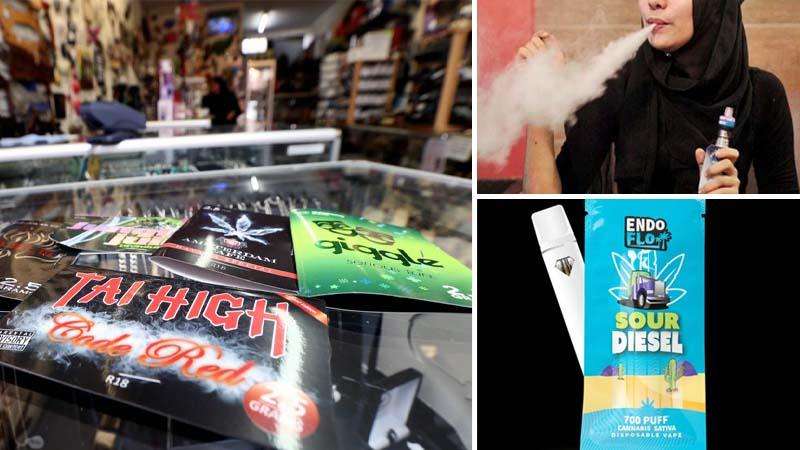Synthetic cannabis addiction has reached an alarming level among young people in East London, including Tower Hamlets. THC vape juice and synthetic cannabis are illegal in the UK, but fake CBD vapes laced with synthetic cannabis are being openly sold in vape shops across East London, including Whitechapel. School students are also becoming addicted to synthetic cannabis vaping.
This dangerous substance is causing various health issues, including liver damage, dental problems, throat infections, and other serious conditions among young users. This terrible addiction is destroying our community. Hundreds of vape shops in East London are openly selling these illegal disposable vapes and separate liquids. They are also selling coils and other prohibited equipment.
Our investigation has revealed that these deadly drugs are being manufactured locally by mixing various harmful chemicals. British-Bangladeshi teenagers, young women, and even middle-aged men are falling into the trap of this deadly addiction under the guise of quitting cigarettes. Several users told this reporter that they experience temporary physical and sexual arousal after consuming these drugs.
If You Buy Weed Vapes, Beware
Synthetic cannabis is nothing like actual cannabis. Instead of making users feel relaxed, hungry, and giggly, it can induce extreme paranoia, hallucinations, and severe health risks. Since multiple U.S. states legalized recreational cannabis, demand for weed vape pens and cartridges has surged in the UK.
In the U.S., unregulated cannabis vapes have been linked to a series of vape-related injuries and deaths. There is growing evidence that many producers and sellers of unregulated cannabis vapes are replacing or supplementing THC and CBD with synthetic cannabinoids, causing users to become dangerously intoxicated.
UK specialists warn that even those using cannabis THC vapes run the risk of inhaling xylazine, an extremely deadly substance. Certain seized products have been found to contain this so-called "zombie drug," which is designed to sedate large animals like horses and cows and can be fatal to humans.
Experts say it is "alarming" to find xylazine even in a small number of illegal e-cigarettes, as many people believe these products to be relatively safe. This substance endangers users, especially those who inject or consume potent drugs.
What Are Cannabis Vapes?
Tetrahydrocannabinol (THC) is the main psychoactive compound in cannabis, and THC vapes are illegal in the UK. Cannabidiol (CBD) is another component of the cannabis plant that does not produce a high. CBD oil, including CBD vapes, is legal in the UK.
Dr. Copeland warned, "People may not realize what they are actually buying. They think they are getting a THC vape, but it could contain much more than they expect. It's really alarming."
The UK's Advisory Council on the Misuse of Drugs recently recommended that xylazine be classified as a Class C drug, placing it in the same category as laughing gas, anabolic steroids, and benzodiazepines. If approved, possession could result in up to two years in jail, while dealing the drug could carry a 14-year sentence.
The health risks are even greater when xylazine is combined with other strong sedatives. Recent studies suggest that the percentage of new schizophrenia cases linked to synthetic cannabis use has nearly tripled over the past 20 years, increasing as access to the drug expanded for medical and later recreational use.
Experts say a new study, which analyzed more than 13.5 million medical records of individuals aged 14 to 65, adds to growing evidence that heavy cannabis use can lead to schizophrenia and psychosis.
CBD: The Misconceptions and Risks
CBD (short for cannabidiol) is one of many naturally occurring chemicals in the cannabis plant. It is widely marketed as an alternative treatment for pain and is available in various forms, including oils, tinctures, vapes, creams, edibles (such as gummy bears), and soft drinks.
However, a new study warns consumers to be cautious of these products.
"CBD presents consumers with a big problem," said Professor Chris Eccleston from the Centre for Pain Research at Bath. "It's touted as a cure for all pain, but there is a complete lack of quality evidence that it has any positive effects."
He added, "It’s almost as if chronic pain patients don’t matter, and we’re allowing people to profit from their hope and despair."
For their study, published in The Journal of Pain, researchers from the Universities of Bath, Oxford, and Alberta (Canada) reviewed existing research on CBD’s effectiveness for pain relief. They found:
- CBD products sold directly to consumers contain highly variable amounts of CBD—some contain none, while others have much more than advertised.
- Some CBD products also contain additional chemicals, some of which are harmful and illegal in certain jurisdictions. These include THC, the primary psychoactive compound in cannabis.
- Of the 16 randomized controlled trials that have studied pharmaceutical-grade CBD for pain relief, 15 found that it was no better than a placebo.
- A meta-analysis (which combines data from multiple studies) found that CBD use is linked to increased rates of serious adverse events, including liver toxicity.
What Is Synthetic Cannabis?
Synthetic cannabinoids, scientifically known as Synthetic Cannabinoid Receptor Agonists, are psychoactive substances similar to LSD, amphetamines, and even alcohol. They alter mental states, perception, and consciousness. As the name suggests, they are man-made substances designed to mimic the effects of natural cannabis.
Reports indicate that dealers are selling these substances through social media platforms like Snapchat, openly labeling their vapes as "Spice." At least one online retailer is also selling Spice-based vaping fluids.
However, the demand for Spice products is significantly lower than the demand for THC vapes. Because extracted THC is more expensive than Spice, dealers and retailers can make higher profits by mislabeling Spice as THC and selling it to unsuspecting customers.
_2.jpg)

_2.jpg)





.svg)




